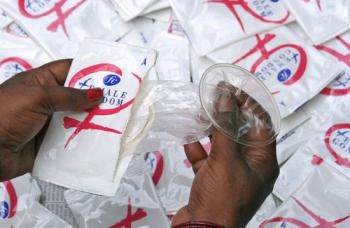Serendip is an independent site partnering with faculty at multiple colleges and universities around the world. Happy exploring!
Carol Rogers


I heard Carol Rogers speak at Bryn Mawr while she was a Hepburn fellow in 2009. I was incredibly impressed with her work at the Department of Health, and am even more awed that – in a very small way – I am now helping to continue the work she began. Among many other things, Rogers helped to initiate a program that distributed free female condoms, which women can insert themselves up to five hours before having sex, to residents of Philadelphia. The program proved very effective – women were more likely to use barrier protection during sex, felt more in control, and felt better about their health. The female condom “was developed as an alternative to male condoms, in recognition that the decision to use male condoms was highly dependent on the willingness of the male sexual partner …The female condom has been widely labeled the only "female initiated" method of preventing STIs.”

When I heard Rogers speak I had never before heard of female condoms, but I now hand them out on a regular basis as part of my work with ASIAC, both when I am testing people for HIV and as part of our outreach. The condoms can be used for both vaginal and anal sex, and populations that are often resistant to condom use (like sex workers) often agree to use female condoms. What really strikes me about Rogers is how she was able to take an idea based on behavioral health research, and test it out with the support of a government organization known for being bureaucratic and resistant to change. I am not sure how Rogers was able to carry out her program, but I understand her success as representing a shift from looking at public health policy surrounding issues like HIV as being about health alone, to an understanding that there are important intersections of sex and gender. As someone who tries to holistically understand public health in a societal and political context, the fact that sexism was factored into healthcare policy is heartening, and a reminder that all future decisions need to be viewed through a similar lens. I not only try to channel Rogers in my work surrounding female condoms, but also when I am planning programs with vulnerable groups of different sexes, races, ethnicities, socioeconomic classes, and nationalities.


Comments
Post new comment